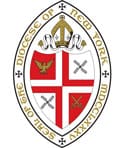Lay Compensation Guidelines
This page comprises the Lay Compensation Guidelines approved by the 1999 Diocesan Convention.
For Clergy Compensation Guidelines, please click here.
Note:
These guidelines are the minimum requirements for each congregation. There is nothing to prevent congregations from providing compensation and benefits higher than those mandated. Indeed, the Trustees Compensation Committee is aware that in some circumstances, the minimum requirements may not be adequate. Each congregation is urged to review the guidelines in light of their individual circumstances (without going below the mandated requirements).
Section A. Mandated Compensation, Benefits and Associated Expenses
Pursuant to the following requirements mandated by Diocesan Convention, each congregation within the Diocese of New York shall provide the following compensation and benefits to each of its lay employees who works 20 hours or more per week and meets the Internal Revenue Service (IRS) criteria for employees (see Treasury Reg. Sec. 31.3401(6)(b)), provided that no congregation shall employ any person not eligible to work in the United States.
- Each congregation shall provide each of its lay employees: an annual IRS W-2 statement no later than January 31st of the following year; coverage under New York State (NYS) workers’ compensation, NYS disability benefits law, and unemployment insurance; and wages no less than required under the Federal Minimum Wage Law.
- Pension Benefits: Each congregation shall provide each of its lay employees with pension benefits as mandated by General Convention and Diocesan Canons.
- Life Insurance: Each congregation shall, on behalf of each of its lay employees, pay the premiums for a life insurance policy. The amount of the insurance policy shall be twice the annual salary to a maximum of $50,000.
- Health Insurance: Each congregation shall provide all of its lay employees with access to the HMO or Indemnity Plans of the Episcopal Church Medical Trust or a comparable carrier. (Note: see Item 4 under Section B. Items strongly urged by Convention.)
- Holidays and Personal Days: Each congregation shall provide each of its lay employees a minimum of 12 paid holidays and/or personal days per year. Paid holidays and personal days do not accrue and must be used in the year they are earned.
- Vacation: Each congregation shall provide each of its lay employee who has completed one year of continuous service, a minimum of 10 paid days of vacation per year. Vacation time does not accrue and must be used in the year it is earned.
- Required Attendance: Each congregation shall compensate its lay employees for all required time spent at any meeting, workshop or other function that the lay employee is required to attend; the employee shall be paid for all required time as time worked. All reasonable and necessary costs of attending such meetings, workshops or other functions shall be paid by the congregation.
- Personal time off without pay: After a lay employee requests personal time off without pay and provides the congregation with adequate documentation of the applicable reason for such personal time off without pay, the congregation shall provide such lay employee with personal time off without pay, and any such additional time as may be required by law, as follows:
| Reason | Maximum Time Off |
| Death of a Family Member | 3 days |
| Birth or adoption of a child | 7 weeks |
| Jury Duty | As required by summons |
| Military Service | As mandated by Federal Law |
Section B. Items strongly urged by Convention
Each congregation within the Diocese of New York is strongly urged to provide lay employees with the following compensation and benefits.
- Whenever possible, vestries are urged to have a Personnel Committee and have a written Personnel and Benefits’ Manual.
- Communications: All lay employees should be provided with a written position description outlining the duties and expectations of their job and should be provided with a written employment agreement. They should also receive an annual review of their performance.
- Salary increases: When performance meets or exceeds expectations, lay employees should receive an increase in salary and/or benefits. When their performance does not meet expectations, they should be given a fair indication of what they need to do to improve their performance to a satisfactory level.
- Health Insurance: Although only “access” to health insurance is mandated, it is strongly urged that congregations contribute to the cost of the health insurance premiums for lay employees.
- 403b Savings Plans/Tax Shelter Annuities (TDAs): The Internal Revenue Code under Section 403b, allows employees of the Church to reduce their taxable income by deferring a portion of their salary in a qualified savings plan. All lay employees should be provided access to one of these plans. The amount the employee chooses to defer is reduced from their taxable income by entering into a salary reduction agreement and the congregation remits the reduction amount to the custodian of the plan. (Note: the lay employee and the congregation must still pay Social Security and Medicare taxes on the full salary before any deductions.)
- Flex Time: Whenever possible, lay employees should be allowed to use flex time so that they can take care of family demands and still work the number of hours required for their position.

